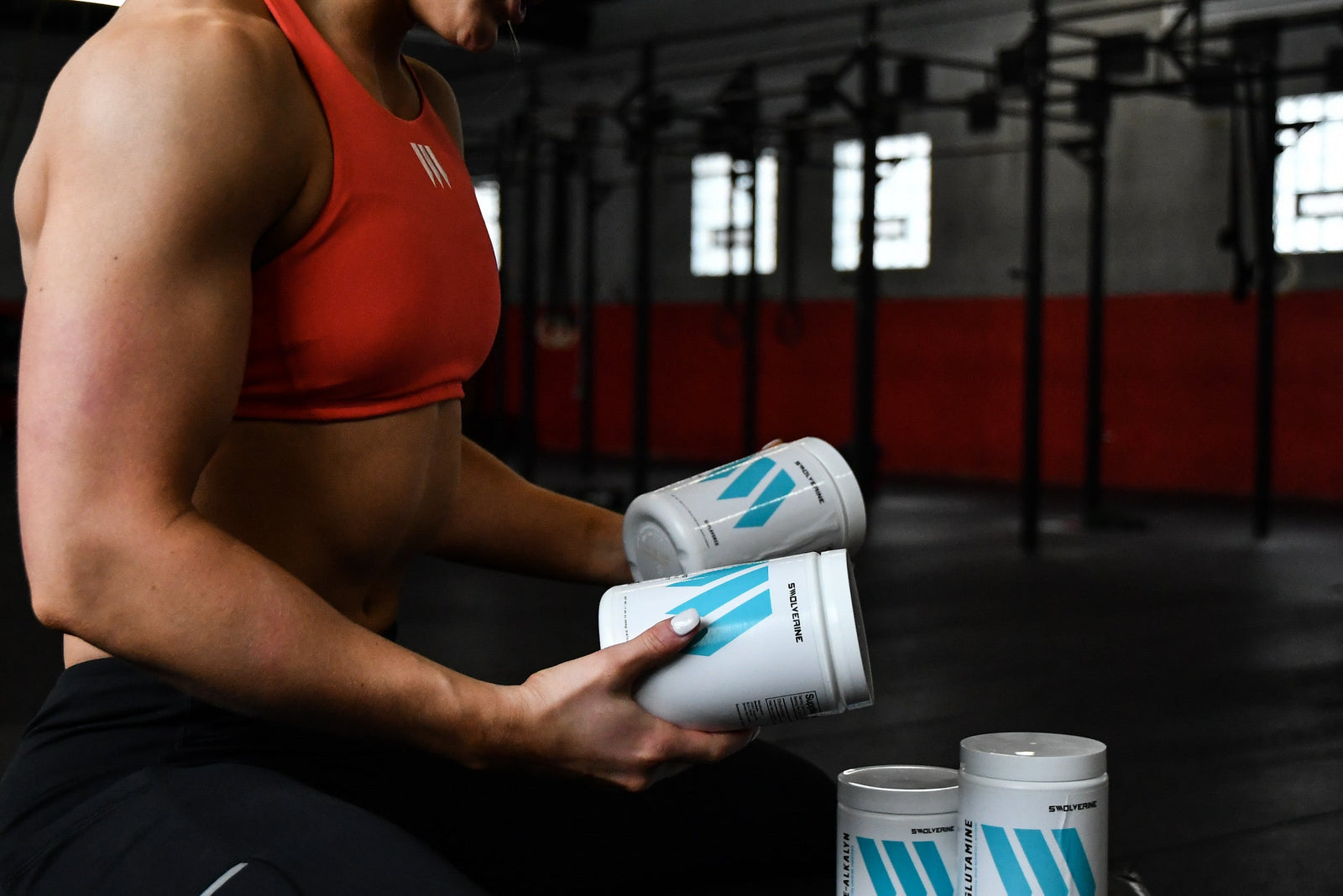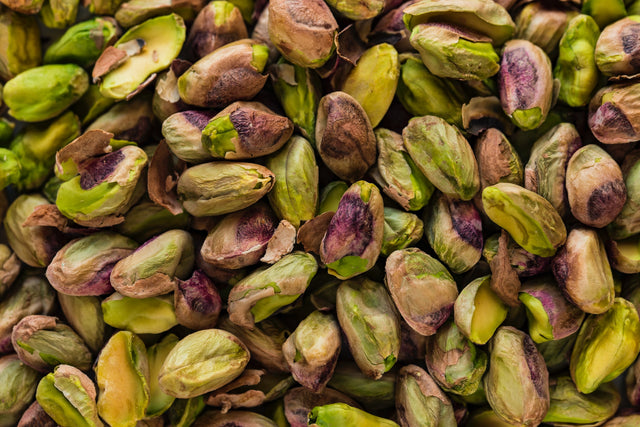Half the battle of optimizing your performance and recovery, is finding the right supplements to get you there. BCAAS and Glutamine are both amino acids, and play a crucial role in the muscle building and repair process. However both serve a very different purpose and offer different ergogenic benefits. Studies show that both glutamine and BCAAs can improve exercise recovery and initiate the muscle building process. But what are some of the differences between BCAAs vs. Glutamine? And do you really need to supplement with both of them? Keep on reading to find out
Amino Acid Basics: Understanding BCAAs vs Glutamine
What Are Amino Acids and Why Do They Matter for Muscle Growth and Recovery?
To clearly understand the differences between BCAAs and glutamine, it's essential to start with the basics: what amino acids are and how they function in the body. Proteins consumed through your diet are broken down into 20 amino acids—of which nine are classified as essential amino acids. These essential amino acids (EAAs) cannot be synthesized by the body and must be obtained through food or supplementation.
The nine essential amino acids include:
-
Leucine
-
Isoleucine
-
Valine
-
Lysine
-
Methionine
-
Phenylalanine
-
Threonine
-
Histidine
-
Tryptophan
Among these, leucine, isoleucine, and valine form a unique subgroup known as Branched Chain Amino Acids (BCAAs). These three amino acids are especially critical for stimulating muscle protein synthesis and promoting muscle recovery post-workout (Blomstrand et al., Journal of Nutrition, 2006).
Glutamine: A Conditionally Essential Amino Acid
Unlike BCAAs, glutamine is categorized as a conditionally essential amino acid. This means that although the body can usually produce it, under certain conditions—such as intense exercise, injury, or illness—glutamine requirements exceed the body’s natural production, making supplementation beneficial (Newsholme, Nutrition Research Reviews, 2001).
How Amino Acids Fuel Performance and Recovery
Amino acids are in constant turnover in the body—new proteins are synthesized, and old proteins are broken down. They’re essential not just for building muscle, but also for:
-
Enzymatic reactions
-
Preventing muscle mass loss
-
Regulating neurotransmitters
-
Supporting energy production
When amino acid intake exceeds breakdown, the body enters a positive amino acid balance—commonly referred to as an anabolic state. This is ideal for muscle building. Conversely, if more amino acids are being broken down than are being consumed or synthesized, the body enters a catabolic state, which leads to muscle loss (Tipton & Wolfe, Journal of Sports Sciences, 2001).
Amino Acids as a Fuel Source
During high-intensity training, the body primarily uses glycogen for fuel. Once glycogen is depleted, it shifts to fatty acids, and eventually, amino acids serve as an energy reserve—especially in prolonged or extreme conditions like:
-
CrossFit competitions
-
Marathons
-
Triathlons
This underscores the importance of amino acid supplementation, especially BCAAs and glutamine, to prevent catabolism and support muscle repair under stress.

What Is Glutamine and What Does It Do?
The Role of L-Glutamine in Muscle Recovery, Immune Function, and Performance
L-Glutamine is the most abundant conditionally essential amino acid found in the human body. It accounts for approximately 60% of the amino acid pool in skeletal muscle tissue, making it a vital component of muscle function and recovery (Cruzat et al., Nutrients, 2018).
Around 90% of glutamine is synthesized in the skeletal muscles, and it’s one of the few amino acids capable of crossing the blood-brain barrier. This unique ability allows glutamine to participate in a wide range of physiological processes, including:
-
Nitrogen transport
-
Acid-base balance
-
Gluconeogenesis (the production of glucose)
-
Acting as a precursor to nucleotide bases
-
Supporting antioxidant defenses via glutathione production
These roles highlight glutamine’s significance in both metabolic health and athletic performance (Wischmeyer, Critical Care Medicine, 2007).
Glutamine's Impact on Muscle Preservation and Recovery
From a performance and recovery standpoint, glutamine helps to:
-
Reduce muscle mass breakdown
-
Decrease delayed onset muscle soreness (DOMS)
-
Support immune system function, especially during periods of overtraining or stress
While typically non-essential under normal circumstances, glutamine becomes essential during high-intensity or prolonged exercise, when natural stores are depleted. This depletion can impair performance by reducing strength, endurance, and recovery capacity.
Why You Should Supplement With Glutamine Post-Workout
Replenishing glutamine levels post-exercise is critical for:
-
Muscle tissue repair and regeneration
-
Reducing inflammation and fatigue
-
Enhancing recovery speed between training sessions
Supplementing with L-Glutamine powder or capsules after a workout helps ensure optimal recovery, particularly for endurance athletes, bodybuilders, and CrossFit enthusiasts.
🔗 RELATED ARTICLE: The Ultimate Guide To L-Glutamine

Clinical Benefits of Glutamine: Immune and Digestive Health
How Glutamine Supports Your Immune System and Gut Health
On the clinical side, L-Glutamine is often referred to as the fuel source for your immune system. This amino acid plays a crucial role in immune function by serving as a substrate for rapidly dividing immune cells, such as lymphocytes and macrophages. Glutamine promotes the production of cytokines, which are small proteins released by white blood cells that help regulate inflammation and immune response.
An increase in cytokine production leads to a stronger immune defense, helping reduce susceptibility to illness and infections, particularly during periods of heavy training or physiological stress (Calder & Yaqoob, Clinical Nutrition, 1999).
Research: Glutamine Supplementation Reduces Post-Workout Illness
In a clinical study conducted by the Department of Biochemistry at Oxford University, 200 elite endurance athletes—including rowers and long-distance runners—consumed either 5g of glutamine or a placebo immediately after training and again two hours later. The results were clear:
-
81% of the glutamine group remained infection-free seven days post-exercise
-
Compared to just 49% in the placebo group
This significant difference underscores glutamine’s potential in strengthening immune resilience after intense training (Castell et al., European Journal of Applied Physiology, 1996).
RELATED ARTICLE: The Best Supplement For Post Workout Recovery And Soreness
Glutamine and Gut Health: Healing from the Inside Out
If you think that’s impressive, the benefits of glutamine extend far beyond muscle and immune health. What truly sets L-Glutamine apart from other amino acids is its powerful effect on digestive health.
Glutamine helps rebuild and repair the intestinal tract, maintaining the integrity of the gut lining by regulating nitrogen balance. This action helps ensure that nitrogen atoms are efficiently distributed to areas where repair and growth are needed most.
This is especially important for individuals dealing with gastrointestinal conditions such as:
-
Leaky gut syndrome
-
Inflammatory bowel diseases (IBD) like Crohn’s disease
-
Ulcerative colitis
-
Irritable bowel syndrome (IBS)
These disorders are often marked by intestinal hyperpermeability, a condition that glutamine has been shown to improve (Rao & Samak, Current Opinion in Clinical Nutrition and Metabolic Care, 2012).
RELATED ARTICLE: How L-Glutamine Can Help Inflammatory Bowel Disease
Top Benefits of L-Glutamine Supplementation
-
Reduced Muscle Mass Breakdown
-
Initiated Muscle Protein Synthesis
-
Improved Recovery Times
-
Decreased Muscle Soreness
-
Improved Immune Health
-
Enhanced Digestive Health
-
Relief from Symptoms of IBD

What Are BCAAs and What Do They Do?
The Muscle-Building Role of Branched-Chain Amino Acids (BCAAs)
Branched-Chain Amino Acids (BCAAs) are among the most popular and well-researched supplements for building and preserving muscle. Comprised of the essential amino acids L-Leucine, Isoleucine, and Valine, BCAAs are considered the fundamental building blocks of protein. Their primary function is to stimulate muscle protein synthesis and inhibit muscle breakdown, also known as muscle catabolism.
By helping maintain a positive amino acid balance, BCAAs provide the muscle fuel necessary to preserve lean muscle mass—especially during intense training or calorie deficits (Jackman et al., Journal of Nutrition, 2010).
What Makes BCAAs Unique?
Unlike other essential amino acids, BCAAs have a branched aliphatic side chain—meaning they feature a central carbon atom bound to three or more carbon atoms. This distinct molecular structure gives them unique metabolic and functional roles in the body.
BCAAs are primarily involved in intramuscular signal transduction, a biological process that controls and activates muscle protein synthesis. Of the three, Leucine is considered the most critical due to its higher oxidation rate and stronger ability to trigger anabolic pathways like mTOR signaling, which promotes lean muscle growth and strength gains (Nair & Short, American Journal of Clinical Nutrition, 2005).
This is why most BCAA supplements use a leucine-heavy ratio, such as 2:1:1 or even 4:1:1 (leucine:isoleucine:valine), to maximize muscle-building effects.
RELATED ARTICLE: What’s The Best BCAA Ratio?
BCAAs and Post-Workout Recovery
Much like L-Glutamine, BCAAs significantly accelerate recovery times by reducing muscle protein degradation and initiating the repair process. They are especially beneficial for minimizing exercise-induced muscle soreness (DOMS) and maintaining performance across multiple training sessions.
Research: BCAAs Reduce Muscle Damage and Speed Up Recovery
A study published in the Journal of the International Society of Sports Nutrition examined the effects of BCAA supplementation on exercise-induced muscle damage. Twelve male participants performed 100 consecutive drop jumps to test the severity and recovery from muscle damage. The results showed that those who supplemented with BCAAs before and after exercise experienced:
-
Lower levels of muscle damage markers
-
Faster recovery at 24, 48, 72, and 96 hours post-exercise (Howatson et al., JISSN, 2012)
RELATED ARTICLE: The Ultimate Guide To BCAAs
Top Benefits of BCAA Supplementation
-
Improved Muscle Recovery
-
Reduced Muscle Mass Breakdown
-
Rebuilding Lean Muscle Mass
-
Reduced Exercise-Induced Muscle Soreness
-
Delayed Muscle Fatigue
-
Increased Energy Levels
-
Improved Endurance
-
Enhanced Body Composition
BCAAs vs Glutamine: Key Differences and Benefits
How BCAAs and Glutamine Compare in Structure, Function, and Performance
While both Branched-Chain Amino Acids (BCAAs) and L-Glutamine are widely used to enhance recovery by reducing muscle mass breakdown and exercise-induced muscle soreness, there are several fundamental differences between them in terms of structure, function, and clinical impact.
Molecular Differences
From a molecular standpoint, BCAAs and glutamine are structurally distinct. BCAAs—composed of leucine, isoleucine, and valine—feature aliphatic side chains with a central carbon atom bound to three or more carbon atoms. This branching structure contributes to their unique function in intramuscular signal transduction and protein synthesis activation.
In contrast, L-Glutamine lacks this branching structure, which sets it apart biochemically and functionally. Glutamine’s role centers more on nitrogen transport, gut health, and immune system support.
Essential vs. Conditionally Essential
-
BCAAs are essential amino acids, meaning your body cannot produce them. They must be consumed through food or supplementation.
-
Glutamine is conditionally essential, which means the body can usually produce it in adequate amounts. However, during periods of physical stress, illness, or intense exercise, the body’s demand can exceed its production capacity—making dietary or supplemental glutamine necessary (Cruzat et al., Nutrients, 2018).
Performance Outcomes: Strength, Energy, and Body Composition
BCAAs have been extensively studied for their effects on muscle recovery, body composition, energy production, and strength performance. Research has shown that BCAA supplementation may:
-
Improve lean muscle mass
-
Delay fatigue
-
Increase training capacity and strength (Jackman et al., Journal of Nutrition, 2010)
On the other hand, while glutamine plays a role in recovery and reducing soreness, clinical evidence supporting its ergogenic benefits—such as muscle mass gains or strength improvements—is limited (Candow et al., Applied Physiology, Nutrition, and Metabolism, 2001).
Digestive Health and Gut Integrity
One of glutamine’s key advantages over BCAAs lies in its impact on gut health. Due to its role in maintaining nitrogen balance, glutamine aids in rebuilding the intestinal tract and reinforcing the integrity of the gut lining.
Research shows that glutamine supplementation may reduce intestinal hyperpermeability, commonly associated with leaky gut, Crohn’s disease, ulcerative colitis, and IBS (Rao & Samak, Current Opinion in Clinical Nutrition and Metabolic Care, 2012).
Immune System Support
Unlike BCAAs, glutamine is critical for immune function. It acts as the primary fuel source for white blood cells, which use it to produce cytokines—signaling proteins that regulate immune responses. During periods of overtraining, athletes often experience a suppressed immune system. Supplementing with glutamine may enhance immune resilience and reduce infection risk (Calder & Yaqoob, Clinical Nutrition, 1999).

Should I Take BCAAs or Glutamine?
How to Choose Based on Your Goals and Recovery Needs
Whether you should supplement with BCAAs, glutamine, or both ultimately depends on your training goals, diet, and recovery needs.
If your primary focus is to increase muscle mass, enhance energy production, and optimize recovery, then BCAA supplementation can support better performance outcomes. BCAAs are particularly effective for stimulating muscle protein synthesis, reducing muscle catabolism, and supporting lean body mass during intense training.
On the other hand, if you consistently experience muscle soreness, slow recovery, or digestive discomfort, then glutamine supplementation may be more beneficial. Glutamine has been shown to reduce soreness, aid in gut health, and strengthen immune system function, especially during periods of overtraining (Cruzat et al., Nutrients, 2018).
Why You Might Want to Take Both
Several studies suggest that combining BCAAs with glutamine may offer synergistic effects. Together, they support greater muscle protein synthesis and further reduce muscle breakdown, which can result in faster recovery, improved lean muscle development, and greater strength over time.
Although the precise mechanism of interaction between BCAAs and glutamine remains under investigation, current research suggests a close relationship in protein metabolism. Since BCAAs serve as the body’s primary nitrogen source, and glutamine regulates nitrogen balance, glutamine effectively helps initiate and sustain muscle-building processes (Holecek, Physiological Research, 2002).
Glutamine has also been shown to inhibit proteolysis (protein breakdown) and may even reduce the catabolism of BCAAs, creating a more favorable internal environment for recovery and growth.
BCAAs vs Glutamine: Commonly Asked Questions
Are BCAAs and Glutamine Necessary?
Whether you need to supplement with BCAAs or glutamine depends on your dietary protein intake and training demands.
If you already consume 1.0–1.4 grams of protein per pound of body weight, you’re likely getting enough amino acids through your diet. In such cases, supplementation may not be essential for the average athlete or gym-goer.
However, for individuals undergoing intense training, in a caloric deficit, or dealing with digestive or immune issues, supplementation becomes more relevant. Specifically, to derive the therapeutic and ergogenic benefits of glutamine, studies recommend consuming 5–10 grams daily to improve immune response, gut health, and symptoms related to inflammatory bowel conditions (Rao & Samak, Current Opinion in Clinical Nutrition and Metabolic Care, 2012).
Does Glutamine Build Muscle?
While glutamine has shown potential benefits in reducing fatigue, aiding recovery, and supporting cellular hydration, the evidence supporting glutamine as a muscle-building supplement is limited. Unlike BCAAs, glutamine doesn’t appear to significantly enhance strength, power, or hypertrophy on its own (Candow et al., Applied Physiology, Nutrition, and Metabolism, 2001).
Instead, glutamine’s real power lies in what it supports indirectly—immune health, gut repair, and overall recovery—all of which are crucial for consistent performance over time.
Is Glutamine a Waste of Money?
When Glutamine Is Worth Taking—and When It Might Not Be
The truth is, any supplement can be a waste of money if it’s not used correctly or applied in a way that supports your individual needs and goals. Glutamine is no exception.
If you don’t struggle with recovery, have no digestive health concerns, and already consume a well-balanced, high-protein diet, then glutamine supplementation may offer minimal additional benefit for you.
However, if you:
-
Suffer from digestive issues like leaky gut or IBD
-
Are frequently sick or immunocompromised
-
Experience chronic muscle soreness or slow recovery after workouts
Then supplementing with 5–10 grams of L-Glutamine daily can significantly improve overall recovery, support gut repair, and boost immune system resilience (Cruzat et al., Nutrients, 2018; Rao & Samak, Current Opinion in Clinical Nutrition and Metabolic Care, 2012).
In the right context, glutamine is not a waste—it’s a tool. Like all tools, it only works when used with intention and aligned with your goals, diet, and physical stress levels.
BCAAs Vs. Glutamine: Takeaway
When it comes to optimizing performance, it’s important to find the supplements that will help you perform at your highest potential. Studies suggest that BCAAs can help rebuild and repair muscle mass, by inhibiting muscle mass breakdown and initiating muscle protein synthesis, to recover faster and build more muscle mass. Endurance athletes who endure longer exercise bouts, and multiple workouts per day, can greatly benefit from supplementing with BCAAs to inhibit muscle mass breakdown and remain in an anabolic state. Glutamine is also extremely beneficial to those that need to improve recovery times and reduce post workout muscle soreness. Adding 5g of Glutamine to your BCAAs post workout, can greatly enhance your recovery process and replenish your body with the amino acids it needs to optimize performance.
Ready to take your performance to the next level and add some BCAAs to training?
SWOLVERINE is an endurance athlete and active lifestyle brand. Made for the elite athlete, and the strong-willed our products were designed to fuel your athletic performance. We perform when you perform.
We believe that everyone can optimize not only their athletic performance but their human potential. The way we believe we can optimize performance is through transparency, clinically effective doses, and clinically proven ingredients with evidence-based outcomes. We provide the nutrients you need to power your active lifestyle.
References
Coqueiro, Audrey Yule et al. “Glutamine as an Anti-Fatigue Amino Acid in Sports Nutrition.” Nutrients vol. 11,4 863. 17 Apr. 2019, doi:10.3390/nu11040863







